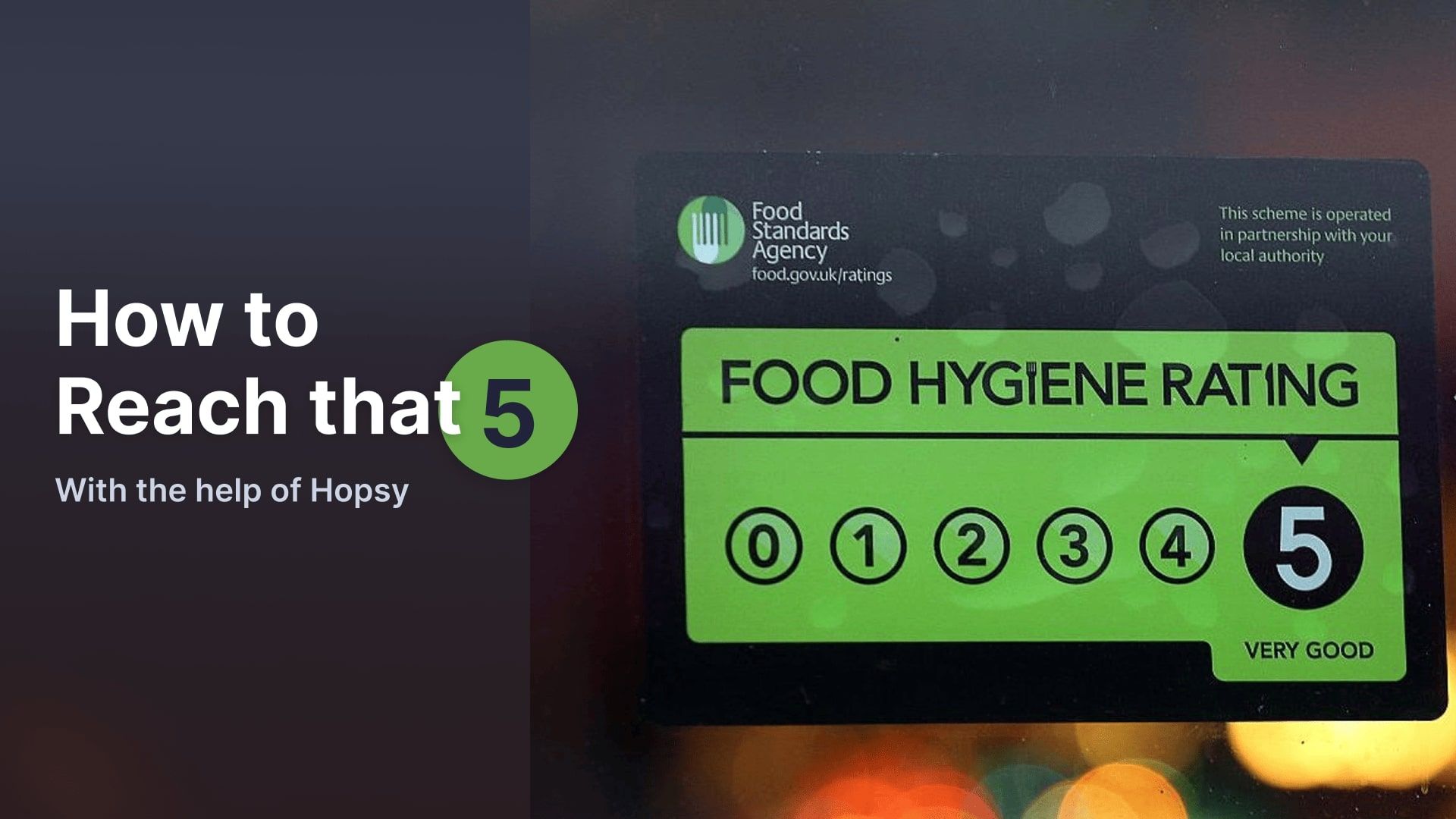Article
How to achieve a five star food hygiene rating

The hospitality industry has been through the wringer. We’ve survived endless lockdowns. Adapted to regulations. Even served sausage rolls on the street to loyal punters.
But there’s one more hurdle before our big comeback.
People are more safety-conscious than ever. 85% are now aware of their favourite eateries’ hygiene standards, with 2 in 3 customers looking out for a score on the door.
In 2022, having a stella hygiene score is a must.
Read on to guarantee top marks in our simple guide to food hygiene.
What is a food hygiene rating?
The Food Hygiene Rating Scheme (FHRS) is a system used by the Food Standards Agency (FSA) in England, Wales and Northern Ireland.
Using a straightforward 0-5 score, a food hygiene rating demonstrates a venue’s safety standards. This includes everything from safe food handling to general cleanliness.
So what do the FSA ratings mean?
Food hygiene ratings explained:
The hygiene rating scores are pretty clear - and a simple way of illustrating your cleanliness to your customers:
5 – hygiene standards are very good
4 – hygiene standards are good
3 – hygiene standards are generally satisfactory
2 – some improvement is necessary
1 – major improvement is necessary
0 – urgent improvement is required
###How to get a food hygiene rating of 5
There are five must cover areas to achieve a level 5 hygiene rating:
Food preparation
Avoid cross contamination during your food prep with the following measures:
- Always keep raw and ready-to-eat foods separate - this includes raw veggies that haven’t been washed or cooked
- Use colour-coded chopping boards to help achieve a 5 star hygiene rating
- For larger kitchens, dedicate separate sinks or workspaces for raw fish, meat, vegetables and ready-to-eat foods
- For smaller spaces, establish a food preparation schedule where different ingredients are prepped at different points in the day, ensuring ready-to-eat foods are first
- Make sure all areas and utensils are cleaned thoroughly between each stage of preparation
Food storage
- Avoid common errors by storing raw and ready-to-eat foods separately
- Ensure you have a labelled storage system with clearly displayed use-by-dates
- Never store food on the floor, always use racks
Cleaning
- It might seem obvious to talk about cleaning in a post-pandemic world, but you can never be too cautious when it comes to a sanitised workspace.
- Stick to a strict cleaning schedule where each task is broken down to ensure you clean in a consistent manner
- Keep a sanitised sink dedicated to handwashing and stock up on blue hand roll and antibacterial soap
- Clean work surfaces regularly and deep clean fridges at the end of each month
Staff training
- Training your staff on safe food handling and preparation is key to receiving your 5 star food and hygiene certificate. This should also include:
- Food hygiene, personal hygiene and hand washing practices
- HACCP system training; risk management and preventing hazards
- Codes of practice, responsibilities and procedures
Record keeping
- When it comes to food hygiene, the proof is in the pudding - you must maintain a secure record of each step:
- Keep records of your Food Safety Policy, risk assessments and staff training
- Ensure all records are up-to-date and documented
- Provide daily check sheets for fridge and freezer temperatures, food temperatures, kitchen cleaning and deliveries
The above steps can seem intimidating. There’s a lot to remember. And even the most organised would struggle to keep on top of that pile of paperwork.Hopsy takes the headache out of your food safety management. With full online operation tools, cleaning checklists and real time reports, you can rest easy knowing your hygiene is up to scratch before your next inspection.
5 ways Hopsy can help you achieve a 5 star food hygiene rating
- Custom tasking and cleaning schedules allows for additional measures to be put in place to help maintain a high standard of cleanliness.
- Records of all previous checks, training, meetings and polices are stored for easy access which can be great indicators of your business commitment to proper procedure incase of a surprise inspection.
- Stay diligent with real time reporting. With clear oversight of all your venues you can spot gaps in performance with clear scores for each venue.
- Records of all previous checks, meetings and polices are stored for easy access.
- Built in ticket system keeps area managers notified of missing equipment, incidents and other areas of concern, ensuring they can be taken care before they cause further issues.